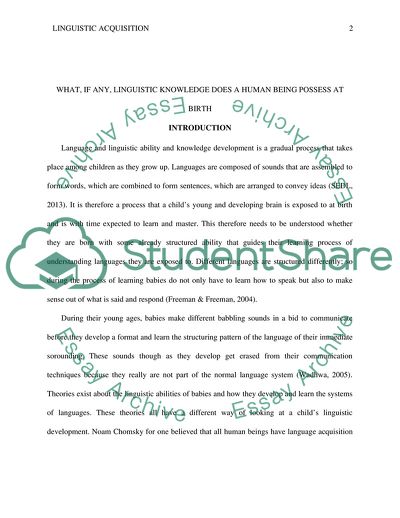Cite this document
(What, If Any, Linguistic Knowledge Does a Human Being Possess at Birth Coursework Example | Topics and Well Written Essays - 2500 words - 1, n.d.)
What, If Any, Linguistic Knowledge Does a Human Being Possess at Birth Coursework Example | Topics and Well Written Essays - 2500 words - 1. https://studentshare.org/psychology/1798907-what-if-any-linguistic-knowledge-does-a-human-being-possess-at-birth
What, If Any, Linguistic Knowledge Does a Human Being Possess at Birth Coursework Example | Topics and Well Written Essays - 2500 words - 1. https://studentshare.org/psychology/1798907-what-if-any-linguistic-knowledge-does-a-human-being-possess-at-birth
(What, If Any, Linguistic Knowledge Does a Human Being Possess at Birth Coursework Example | Topics and Well Written Essays - 2500 Words - 1)
What, If Any, Linguistic Knowledge Does a Human Being Possess at Birth Coursework Example | Topics and Well Written Essays - 2500 Words - 1. https://studentshare.org/psychology/1798907-what-if-any-linguistic-knowledge-does-a-human-being-possess-at-birth.
What, If Any, Linguistic Knowledge Does a Human Being Possess at Birth Coursework Example | Topics and Well Written Essays - 2500 Words - 1. https://studentshare.org/psychology/1798907-what-if-any-linguistic-knowledge-does-a-human-being-possess-at-birth.
“What, If Any, Linguistic Knowledge Does a Human Being Possess at Birth Coursework Example | Topics and Well Written Essays - 2500 Words - 1”. https://studentshare.org/psychology/1798907-what-if-any-linguistic-knowledge-does-a-human-being-possess-at-birth.


